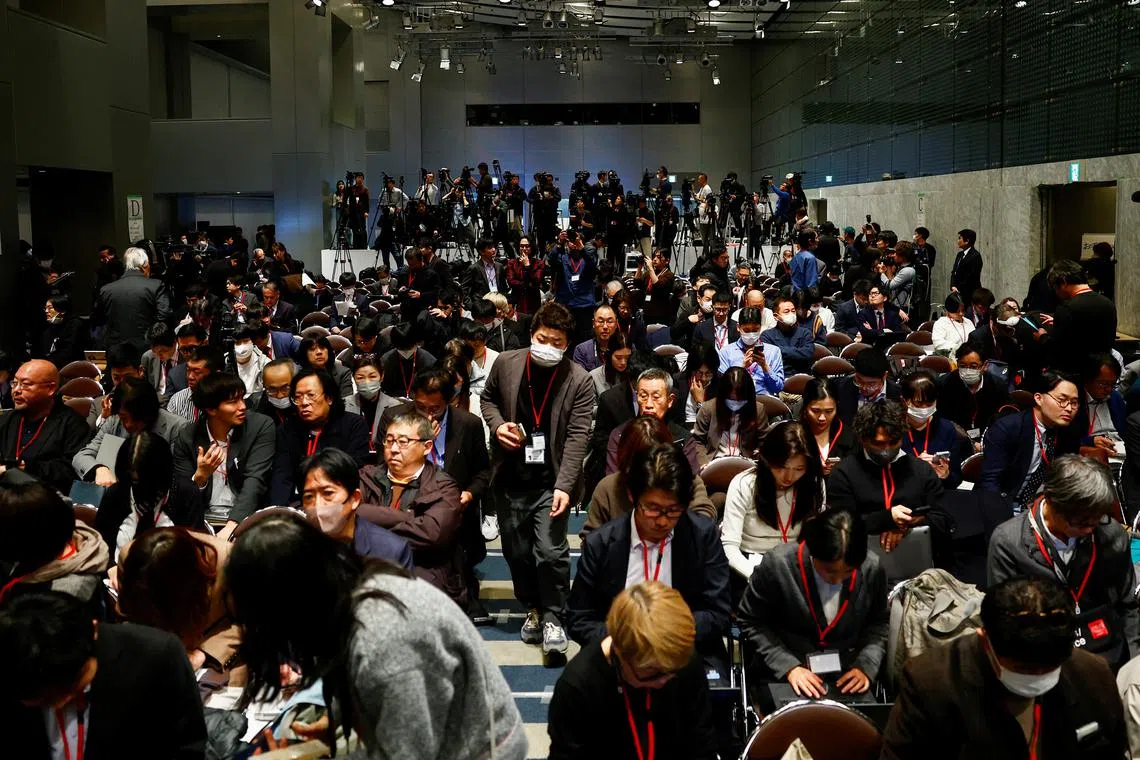Japan’s Fuji TV bosses resign following J-pop megastar’s sexual assault scandal
Sign up now: Get insights on Asia's fast-moving developments

Fuji TV has been embroiled in a scandal since December when Japanese magazines accused Masahiro Nakai of sexual misconduct.
PHOTO: REUTERS
TOKYO - The chairman and president of Japan’s Fuji Television resigned on Jan 27, weeks after a celebrity presenter and former pop star was accused of sexual assault
Criticism has mounted from advertisers and the public over the scandal, which centres around TV host and J-pop megastar Masahiro Nakai.
A leading tabloid magazine reported in December that the 52-year-old Nakai had carried out a sexual act without a woman’s consent in 2023.
Nakai reportedly later paid the woman, who worked for Fuji TV, a lump sum of 90 million yen (S$780,000), and the pair signed a non-disclosure agreement.
As pressure mounted, the broadcaster announced on Jan 27 that Fuji TV president Koichi Minato and chairman Shuji Kanoh were stepping down.
A growing number of top advertisers pulled their commercials from the network after staff were accused of trying to cover up the scandal.
Earlier in January, Mr Minato admitted that the broadcaster was aware of the scandal before it was reported by local media.
The company has denied claims that its staff were involved in organising Nakai’s meeting with the woman, which allegedly took place at the star’s home.
Nakai – a former member of the boy band Smap, which swept charts across Asia in the 1990s and 2000s – announced his retirement on Jan 24
“I alone am responsible for everything” and “sincerely apologise”, Nakai said on Jan 24.
He had previously issued a statement saying some of what had been reported was “different from the facts”.
‘Outraged’
Dozens of brands, including McDonald’s and Toyota, have pulled adverts from Fuji TV, leaving only unpaid public service announcements playing during commercial breaks.
The scandal follows another huge reckoning for Japan’s entertainment industry, involving now-defunct boy band empire Johnny & Associates, to which Smap belonged.
Johnny & Associates, which has now changed its name, admitted in 2023 that its late founder Johnny Kitagawa had sexually assaulted teenage boys
The allegations against Nakai emerged in December. The tabloid reports shocked the nation, even as most other Japanese media have more cautiously referred to the allegations as sexual “trouble” or misconduct.
Some reports say staff at Fuji TV – and other channels – have long wined and dined entertainers, inviting women staff to join such parties.
Network president Mr Minato held a short press conference on Jan 17, after US activist investor Rising Sun Management said it was “outraged” by Fuji TV’s lack of transparency.
But the public relations attempt backfired after only select media were invited, video recording was not allowed and Mr Minato declined to answer many questions, citing a fresh investigation.
Rising Sun Management, a shareholder in the station’s parent company, has called on the network to establish a committee of outside experts, describing Mr Minato’s press briefing as “nothing less than a virtual car crash”.
Fuji Television is a major private broadcaster that boasted the highest viewer ratings in the 1980s and early 1990s with its soap operas and popular comedy and variety shows.
It aired Japan’s first domestically produced animation “Astro Boy” in 1963, and has also produced several films, including Hirokazu Kore-eda’s “Shoplifters” which won the 2018 Palme d’Or at Cannes. AFP


